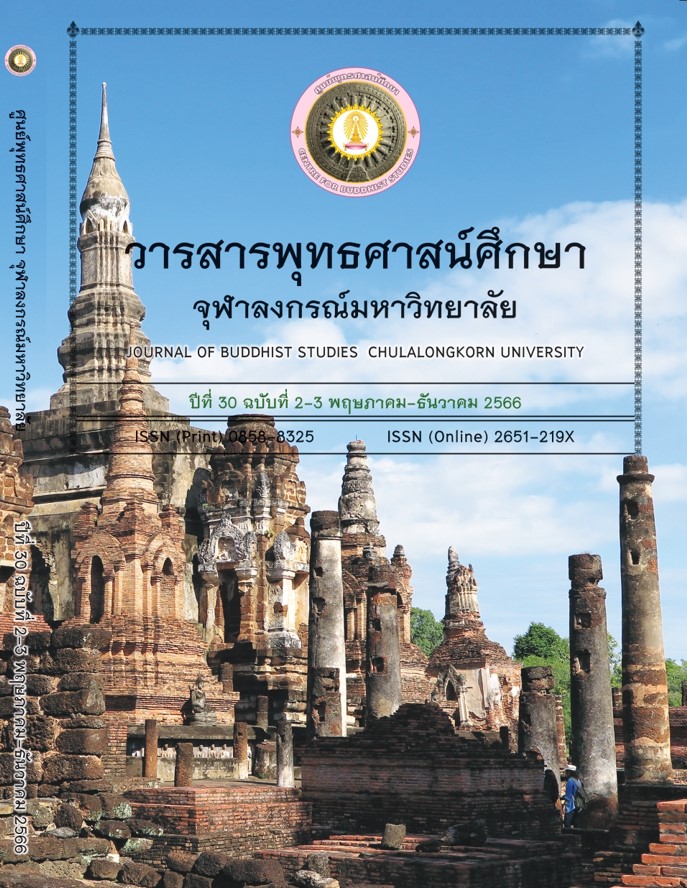Morality and Corruption Prevention
Keywords:
Morality, Ethics, Virtue, CorruptionAbstract
Morality is usually found as a component in measures proposed for corruption prevention. Underlying presuppositions are that corruption is opposite to morality, and moral cultivation leads to corruption prevention. However, these two presuppositions are problematic from the philosophical perspective. A conceptual analysis showed that, according to the mainstream view, morality is not a component of the concept of corruption. As a result, cases can be found in which moral persons commit corruption. The concept of immoral corruption, then, has to be considered in order to provide a framework for corruption prevention through morality.
Downloads
References
กีรติ กมลประเทืองกร. (2559). พุทธวิธีการแก้ปัญหาทุจริตคอร์รัปชั่นในสังคมไทย. วารสาร มจร การพัฒนาสังคม, 1(3), 16-27.
จิตศริณย์พร ปัญจวัฒนคุณ. (2562). คุณธรรมกับปัญหาคอร์รัปชั่นในสังคมไทย. วารสารพุทธมัคค์ ศูนย์วิจัยธรรมศึกษา สานักเรียนวัดอาวุธวิกสิตาราม, 4(2), 1-9.
ธัศฐ์ชาพัฒน์ ยุกตานนท์. (2561). พุทธจริยศาสตร์: ทางเลือกของการป้องกัน การทุจริตคอร์รัปชั่น. วารสารสันติศึกษาปริทรรศน์ มจร, 6(ฉบับพิเศษ), 624-634.
ปกรณ์ สิงห์สุริยา. (2564). ศีลธรรมกับคอร์รัปชั่น. การวิเคราะห์เชิงมโนทัศน์. กรุงเทพฯ : เอส.ออฟเซ็ท กราฟฟิคดีไซน์
พระครูโกวิทอรรถวาที. (2560). การทุจริต: ข้อสังเกตในการแก้ปัญหาของพระพุทธ ศาสนา. วารสารธาตุพนมปริทรรศน์, 1(1), 62-75.
พระพรหมคุณาภรณ์ (ป.อ. ปยุตโต). (2559). พจนานุกรมพุทธศาสน์ ฉบับประมวล ธรรม. พิมพ์ครั้งที่ 34. กรุงเทพฯ : มูลนิธิการศึกษาเพื่อสันติภาพ พระธรรมปิฎก (ป.อ. ปยุตฺโต).
พระพรหมคุณาภรณ์ (ป.อ. ปยุตโต). (2563). จริยธรรมสําหรับคนรุ่นใหม่. พิมพ์ ครั้งที่ 6. กรุงเทพฯ : สํานักพิมพ์มูลนิธิโกมลคีมทอง.
พระมหาศุภวัฒน์ ฐานวุฑฺโฒ, พระถนัด วฑฺฒโน, พระมหาวีรธิษณ์ วรินฺโท, พระครู สิริกาญจนาภิรักษ์ และ ธิติวุฒิ หมั่นมี. (2559). พุทธวิธีการแก้ปัญหา ทุจริตคอร์รัปชั่นในสังคมไทย. วารสาร มจร พุทธปัญญาปริทรรศน์, 1(3), 53-60.
พิเชฐ ทั่งโต. (2559). พุทธธรรมกับการป้องกันปัญหาการทุจริตคอร์รัปชันใน สังคมไทย. วารสารจันทรเกษมสาร, 22(43), 1-15.
มหาเถรสมาคม สํานักงานพระพุทธศาสนาแห่งชาติ และสํานักงานคณะกรรมการ ป้องกันและปราบปรามการทุจริตแห่งชาติ. (2563). การจัดทําหนังสือ หลักธรรมคําสอนในพระพุทธศาสนากับหลักสูตรต้านทุจริตศึกษา (AntiCorruption Education). มปท. ศัพท์บัญญัติสํานักงานราชบัณฑิตสภา. สืบค้นจาก https://coined-word.orst.go.th/index.php
สํานักงานคณะกรรมการป้องกันและปราบปรามการทุจริตแห่งชาติ (2562ก). หลักสูตรอุดมศึกษา (วัยใส ใจสะอาด “Youngster with Good Heart”). กรุงเทพฯ : ผู้แต่ง
สํานักงานคณะกรรมการป้องกันและปราบปรามการทุจริตแห่งชาติ (2562ข). หลักสูตรโค้ชเพื่อการรู้คิดต้านทุจริต. กรุงเทพฯ : ผู้แต่ง.
สํานักงานคณะกรรมการป้องกันและปราบปรามการทุจริตแห่งชาติ (2562ค). หลักสูตรตามแนวทางรับราชการกลุ่มทหารและตํารวจ. กรุงเทพฯ : ผู้แต่ง.
สํานักงานคณะกรรมการป้องกันและปราบปรามการทุจริตแห่งชาติ (2562ง). หลักสูตรสร้างวิทยากรผู้นําการเปลี่ยนแปลงสู่สังคมที่ไม่ทนต่อการทุจริต. กรุงเทพฯ : ผู้แต่ง.
สํานักงานคณะกรรมการป้องกันและปราบปรามการทุจริตแห่งชาติ และสํานักงาน คณะกรรมการการศึกษาขั้นพื้นฐาน. (2561). คู่มือหลักสูตรต้านทุจริต ศึกษา (Anti-Corruption Education). หลักสูตรการศึกษาขั้นพื้นฐาน ชุดหลักสูตรต้านทุจริตศึกษา (Anti-Corruption Education) พุทธศักราช 2561. กรุงเทพฯ : สํานักพัฒนานวัตกรรมการจัดการศึกษา
สํานักงาน คณะกรรมการการศึกษาขั้นพื้นฐาน กระทรวงศึกษาธิการ สํานักงานคณะกรรมการวิจัยแห่งชาติ. (2558). คู่มือมาตรฐานการเผยแพร่ผลงาน วิจัยและผลงานทางวิชาการ. กรุงเทพฯ : ผู้แต่ง.
Argandona, A. (2005). Corruption and Companies: The Use of Facilitating Payment. Journal of Business Ethics, 60, 251-264.
Deigh, J. (1999). Ethics. In Robert Audi (Ed.), The Cambridge Dictionary of Philosophy. 2nd Edition. Cambridge: Cambridge University Press.
Frankena, W. K. (1973). Ethics. 2nd Edition. Englewood Cliffs, NJ: Prentice-Hall.
International Committee of Medical Journal Editors. (2023). Defining the Role of Authors and Contributors. Retrieved from https://www.icmje.org/recommendations/browse/roles-and-responsibilities/defining-the-role-of-authors-and-contributors.html
Lessig, L. (2013). ‘Institutional Corruption’ Defined. Journal of Law. Medicine & Ethics, 41(3), 553 - 555.
Luo, Y. (2002). Corruption and Organization in Asian Management Systems. Asia Pacific Journal of Management, 19, 405-422.
Miller, S. (2014). The Corruption of Financial Benchmarks: Financial Markets. Collective Goods and Institutional Purposes. Law and Financial Markets Review, 8(2), 155-164.
Miller, S. (2017). Institutional Corruption: A Study in Applied Philosophy. Cambridge: Cambridge University Press.
Pedersen, K H. and Johannsen, L. (2005). Corruption: Commonality. Causes & Consequences. Comparing 15 Ex - Communist Countries, 19-21. Paper prepared for the 13thNISPacee Annual Conference. Moscow, Russia.
Van Duyne, P. C. (2001). Will CALIGULA Go Transparent? Corruption in Acts and Attitudes. Forum on Crime and Society, 1(2), 73-98.
Vannucci, A. (2015). Three Paradigms for the Analysis of Corruption. Labour & Law Issues, 1(2), 2-30.
Warren, M. E. (2004). What Does Corruption Mean in a Democracy?. American Journal of Political Science 48(2), 328-343.
Downloads
Published
How to Cite
Issue
Section
License
Copyright (c) 2024 Chulalongkorn University Centre for Buddhist Studies

This work is licensed under a Creative Commons Attribution-NonCommercial-NoDerivatives 4.0 International License.
บทความที่ได้รับการตีพิมพ์เป็นลิขสิทธิ์ของศูนย์พุทธศาสน์ จุฬาลงกรณ์มหาวิทยาลัย
ข้อความที่ปรากฏในบทความแต่ละเรื่องในวารสารวิชาการเล่มนี้เป็นความคิดเห็นส่วนตัวของผู้เขียนแต่ละท่านไม่เกี่ยวข้องกับศูนย์พุทธศาสน์ จุฬาลงกรณ์มหาวิทยาลัย และคณาจารย์ท่านอื่นๆในมหาวิทยาลัยฯ แต่อย่างใด ความรับผิดชอบองค์ประกอบทั้งหมดของบทความแต่ละเรื่องเป็นของผู้เขียนแต่ละท่าน หากมีความผิดพลาดใดๆ ผู้เขียนแต่ละท่านจะรับผิดชอบบทความของตนเองแต่ผู้เดียว






